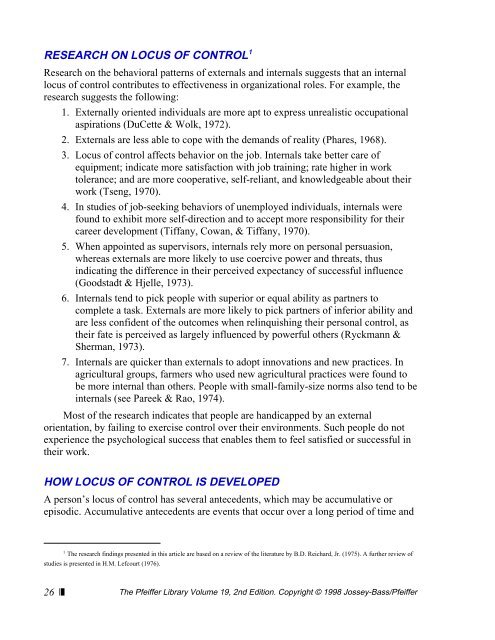motivational analysis of organizations
motivational analysis of organizations
motivational analysis of organizations
You also want an ePaper? Increase the reach of your titles
YUMPU automatically turns print PDFs into web optimized ePapers that Google loves.
RESEARCH ON LOCUS OF CONTROL 1<br />
Research on the behavioral patterns <strong>of</strong> externals and internals suggests that an internal<br />
locus <strong>of</strong> control contributes to effectiveness in organizational roles. For example, the<br />
research suggests the following:<br />
1. Externally oriented individuals are more apt to express unrealistic occupational<br />
aspirations (DuCette & Wolk, 1972).<br />
2. Externals are less able to cope with the demands <strong>of</strong> reality (Phares, 1968).<br />
3. Locus <strong>of</strong> control affects behavior on the job. Internals take better care <strong>of</strong><br />
equipment; indicate more satisfaction with job training; rate higher in work<br />
tolerance; and are more cooperative, self-reliant, and knowledgeable about their<br />
work (Tseng, 1970).<br />
4. In studies <strong>of</strong> job-seeking behaviors <strong>of</strong> unemployed individuals, internals were<br />
found to exhibit more self-direction and to accept more responsibility for their<br />
career development (Tiffany, Cowan, & Tiffany, 1970).<br />
5. When appointed as supervisors, internals rely more on personal persuasion,<br />
whereas externals are more likely to use coercive power and threats, thus<br />
indicating the difference in their perceived expectancy <strong>of</strong> successful influence<br />
(Goodstadt & Hjelle, 1973).<br />
6. Internals tend to pick people with superior or equal ability as partners to<br />
complete a task. Externals are more likely to pick partners <strong>of</strong> inferior ability and<br />
are less confident <strong>of</strong> the outcomes when relinquishing their personal control, as<br />
their fate is perceived as largely influenced by powerful others (Ryckmann &<br />
Sherman, 1973).<br />
7. Internals are quicker than externals to adopt innovations and new practices. In<br />
agricultural groups, farmers who used new agricultural practices were found to<br />
be more internal than others. People with small-family-size norms also tend to be<br />
internals (see Pareek & Rao, 1974).<br />
Most <strong>of</strong> the research indicates that people are handicapped by an external<br />
orientation, by failing to exercise control over their environments. Such people do not<br />
experience the psychological success that enables them to feel satisfied or successful in<br />
their work.<br />
HOW LOCUS OF CONTROL IS DEVELOPED<br />
A person’s locus <strong>of</strong> control has several antecedents, which may be accumulative or<br />
episodic. Accumulative antecedents are events that occur over a long period <strong>of</strong> time and<br />
1 The research findings presented in this article are based on a review <strong>of</strong> the literature by B.D. Reichard, Jr. (1975). A further review <strong>of</strong><br />
studies is presented in H.M. Lefcourt (1976).<br />
26 ❘❚<br />
The Pfeiffer Library Volume 19, 2nd Edition. Copyright © 1998 Jossey-Bass/Pfeiffer

















